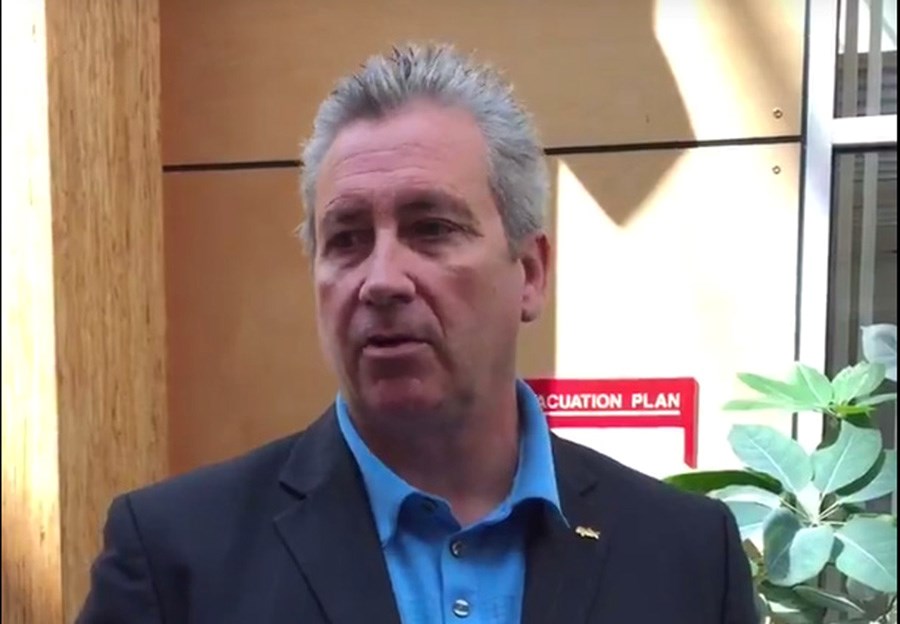Despite an "almost perfect storm of problems", UNBC president Daniel Weeks said the university will weather the current year without any cuts to its operating budget but annual deficits of around $4 million loom in the near-term.
The university's board of governors voted to OK a $75 million balanced operating budget that will, according to a statement, "maintain existing service levels" during its regular meeting Saturday. But that storm of problems – "declining tuition revenue, reduced government grants, and increasing compensation costs" – conspired to create, according to UNBC budget documents, a $2.24 million deficit this year that was closed through a two per cent increase in tuition costs and a handful of temporary stop-gaps.
Those same documents project that $2.24 million deficit could grow to $3.7 million in 2016-17 and may reach $4.3 million – 5.3 per cent of UNBC's anticipated $80.86 million operating budget – the year after. By law, the university must pass a balanced budget so those shortfalls would have to be addressed by either cost-savings or increased revenue.
"All of those (problems) have come together at this moment," said Weeks, who nevertheless described his mood as optimistic after the board met. "It's not like we didn't know it was coming and we have done things to prepare ourselves but it's hit a head and we've got to get a little more aggressive in how we deal with that.
"We're going to begin our next budget cycle very early on with a dialogue with the entire university community, lay out the large issues, the large scope of what we're dealing with... We need to have a plan here about what are the things we're going to invest in. Even though it seems like we're retrenching a bit, that's not the case – we're planning for an exciting future here."
Originally slated for approval in March, the board delayed deciding on the 2015-2016 budget until this month to give administrators a chance to re-examine estimates compiled in February UNBC vice president of Eileen Bray described at the time as "a best-case scenario."
Between the preparation of those February estimates and the March meeting, the university's faculty association shut the school down for two weeks in a labour dispute centred on wages and how much professors are paid as they advance in their careers. The faculty strike ended when UNBC invoked a section of the Labour Relations Act governing first-time collective agreements and referred both sides to a mediator, who ordered they enter binding arbitration. In April, they agreed to recommend the Labour Relations Board appoint New Westminister-based arbitrator Stanley Lanyon to help forge an agreement; a UNBCFA spokesperson said arbitration hearings are likely to begin in the fall.
"The (binding arbitration and the budget) are somewhat separate," said Weeks. "Any increases that come about through our collective agreement are already built into our budget; we are funded for those increases by government. We're not in any particularly worrisome mode there.
"I think it's really more going forward as (board chair John Turner) said. What are the kinds of things we going to have to do here to really streamline our operation, make sure we're efficient, we're using taxpayers' money effectively and in the best interests of British Columbia."
UNBC also recently ratified a collective agreement with non-faculty staff that contained a 5.5 per cent wage increase over five years; it is set to work with non-unionized staff on wage over the next few months, according to budget documents.
"While some non-salary savings are available to offset the cost pressures, the significant budget adjustments needed to address the above shortfalls will have to come primarily from reduced compensation costs," UNBC adminstrators wrote in the documents. "That means priorities need to be set on which programs and services or delivery mechanisms should change."
However Weeks said it would be "somewhat irresponsible" to talk about cuts at this point.
"We need to go through a planning exercise that really looks at what our budget needs to serve and creates some priorities and then we'll take a hard look at that," said Weeks. "There may be some decisions to be made, it's just too early to tell."
He added budget consultations are slated to begin in the fall.
Provincial cuts to UNBC's operating grants will also continue to sting, with the university coming off a reductions of $128,000 in 2013-14, $512,000 last year and a slated further $665,000 this year. The university is likewise enduring less research funding available for institutions across Canada.
It adds surpluses will not be available to "address ongoing operating shortfalls."
But the document says "the single biggest contributing factor" to the university's fiscal challenges is declining tuition revenue. It cites a number of factors for the tuition loss including a "consistent and dramatic decline in the number of youth" in northern B.C. and new universities in southern B.C.
The university anticipates it will receive $925,000 less in tuition revenue this year compared to last.
The two-percent increase to tuition means a full-time undergraduate student will pay $99 more per year for a total of $5,010 annually.
Weeks said changes to how the 2015-16 budget was structured means its total is closer to $85 million.
He added there were no discussions or decisions regarding the university care centre.
He also said outgoing UNBC vice president of external relations Rob van Adrichem will be replaced. Van Adrichem, who according to the Vancouver Sun's database of public sector salaries made $170,277 in 2013-14, will be taking a $159,541-position with the City of Prince George as external relations director.



